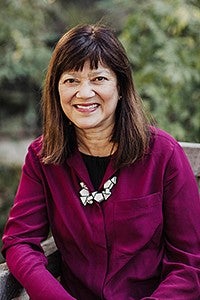
Architecture
akwok@uoregon.edu | 541-346-2126
Courses: ARCH 4/591 Environmental Control Systems 1 (fondly called ECS); ARCH 661 Technical Teaching; ARCH 620 Research Methods in Sustainable Design; ARCH 4/510 Passive House Design and Detail; ARCH 633 History of Sustainability
In my courses you will:
- Make connections to lived experiences and real-world challenges.
- Practice foundational, transferrable skills.
- Learn with and from peers.
- Understand what it means to be at a research university with the chance to gain new knowledge.
I was invited into the Teaching Academy because:
- I am a Herman Award Recipient.
In what ways are you working to make your teaching inclusive?
1) Question of the Week (QoW): Students submit via Canvas a question prompt on a current topic and also can submit a question/curiosity/comment about anything related to the course. We review individual answers and comment directly back to the student and/or bring general questions to the large lecture (anonymously) to discuss issues. 2) mid-term check-in: students are asked anonymously send in what they like about the course, what they don't like, which exercise inspires them, which they think is not challenging. We review all, summarize and come up with an action plan to make some changes.
What do you do in terms of professional engagement with the teaching and learning culture on campus or nationally?
1) I organize and attend summer curriculum retreats with national/international faculty and graduate students on the issues of environmental technology (daylight, acoustics, energy, shading) integration and design. We discuss teaching, learning, and share lectures, exercises, teaching gifts, and teach each other. Scholarships are given to promising graduate students to attend the retreat. 2) I take my GE and undergraduate teaching assistants, co- instructors and invited faculty from other universities to participate in a 2-night, 3-day retreat, where we review and "do" all of the section activities, mark sample homework according to a rubric, and prepare workshop materials for the following term. My motto: the better prepared the GEs and teaching assistants are, the better experience the students will have in the course.
In what ways was your teaching in this course research-led—informed by research on how students learn and inflected by UO's research mission?
I assign a 5-week building performance case study where teams (2-3 students) conduct a study of a real building on how the design works vs environmental topics (e.g. energy use, comfort, indoor air quality, behavior, etc). Students pose research questions, hypotheses, develop an appropriate methodology, learn to use state-of-the-art equipment (e.g. dataloggers, sensors, meters) to measure conditions. Students then analyze the data and present the findings in a poster and 6-8 page paper. This project in lieu of a final exam has been successful at long-term retention of principles and concepts. Case studies are then peer-reviewed for Honorable Mentions and Hall of Fame awards and occasional presentations to practitioners.
What is the most inspiring or exciting thing about your field of study?
Teaching students how to become stewards of the environment through designing buildings that are healthy, energy efficient, durable, and resilient is an exciting venture-- so I'm rather single-minded when it comes to sustainability. Since the urban built environment is responsible for 75% of annual global GHG emissions: buildings alone account for 39%. Eliminating these emissions is the key to addressing climate change. If I can give the students different ways of validating their designs through evidence, rather than greenwash, then I will feel a sense of purpose.
What is your favorite TED Talk or podcast?
Susan Cain: The power of introverts | TED Talk - TED.com After this Ted Talk, I started to think about design education as a very introverted activity, but with an extroverted expression. I also wondered what we need to do to change learning to tap into the quieter, contemplative solutions, yet encourage positive intellectual growth and expressed skills.
